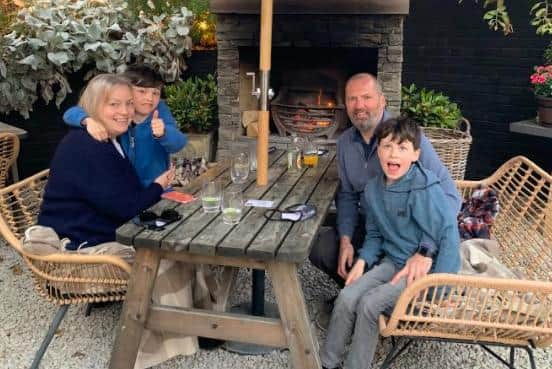East Lothian boy, 10, with muscle-wasting disorder to receive life-changing drug for another 3 years after Scottish Medicines Consortium decision
and live on Freeview channel 276
Cormac Fegan, who has a rare type of Duchenne muscular dystrophy, was the first child in the UK to get the drug Translarna on the NHS shortly after he turned five. The drug can help treat patients with an underlying genetic cause of Duchenne, called nonsense mutations. His parents have said previously it has led to a huge improvement in his behaviour and mobility.
Those affected by the disease usually need a wheelchair fulltime by their early teens but can start using one to get around much earlier. But Cormac’s father, Gary, said: “Cormac can walk from his house in Longniddry to the beach and walk around for an hour. A lot of boys at his age (with Duchenne) are not walking.”
Advertisement
Hide AdAdvertisement
Hide AdInitially, the family had to make funding requests every few months to ensure Translarna would be paid for by their health board until they requested a longer term approval due to the worry of the drug being taken away. The SMC, which decides which medicines should be accepted by NHS Scotland, announced on Monday that the drug will be funded centrally over the next three years while more evidence is gathered on its clinical and cost effectiveness before a final review.


Gary, 48, said: “It means we have got security for the next three years. It’s a step forward and gives us hope. The only thing worse than the diagnosis of a life limiting disorder is knowing there’s something that can help your child but not being able to access it.
“We want it to be as simple as getting an inhaler and standard prescription drugs. There are about another four or five other drugs for other Duchenne mutations on the go and they are starting gene therapy drug trials this year in the UK for the first time. So if more things are approved, the more it means drug manufacturers will choose the UK and Scotland meaning they get into the hands of families as quickly as possible.
“Ideally, we want to get full approval after three years.”
Gary says the new SMC agreement also reflects a European Medical Medicines Agency ruling that boys eligible for Translarna can take it three years earlier than before - from the age of two instead of five.
Advertisement
Hide AdAdvertisement
Hide Ad

He also said that boys with the disease who are not able to walk are currently not allowed the drug, something which he hopes to see overturned.
Duchenne muscular dystrophy is a muscle wasting disease which affects about one in 4,00 boys - and Gary says about 12 percent of sufferers have the same nonsense mutation as Cormac.
Before Cormac’s treatment started five years ago, he suffered behavioural and physical problems such as frequently biting other children at nursery - and he was having difficulty climbing stairs and couldn’t hop or jump.
His father said they started noticing a difference in his behaviour “within days” of him taking Translarna, as well as a change in his stamina with his balance and speed also improving.
Advertisement
Hide AdAdvertisement
Hide Ad

Although the drug is not a cure for Duchenne, families like the Fegans believe it can slow symptoms and allow time for other treatments to become available.
The disease primarily affects boys and causes muscles to weaken and waste over time, and it can also cause other severe health problems to the heart and breathing muscles.
The latest SMC announcement comes after charities Muscular Dystrophy UK, Action Duchenne, Duchenne Family Support Group, and Duchenne UK appeared before the consortium in March.
The SMC said on Monday that it accepts Translarna meets the definition of what is known as ultra-orphan medicine, used to treat extremely rare conditions.
Advertisement
Hide AdAdvertisement
Hide AdOver the next three years, further evidence will be generated on the drug’s clinical and cost-effectiveness before a final decision is made on its routine use in NHS Scotland.
The SMC is a committee of clinicians, pharmacists, NHS board representatives, the pharmaceutical industry and the public. Members consider a broad range of evidence in order to decide which medicines should be accepted by NHS Scotland.
A message from the Editor:
Thank you for reading this article. We're more reliant on your support than ever as the shift in consumer habits brought about by coronavirus impacts our advertisers.
If you haven't already, please consider supporting our trusted, fact-checked journalism by taking out a digital subscription at https://www.edinburghnews.scotsman.com/subscriptions.
Comment Guidelines
National World encourages reader discussion on our stories. User feedback, insights and back-and-forth exchanges add a rich layer of context to reporting. Please review our Community Guidelines before commenting.